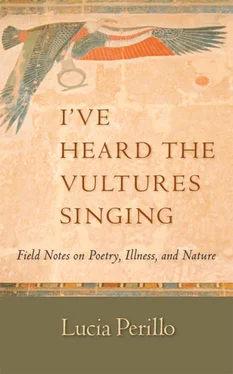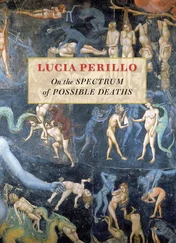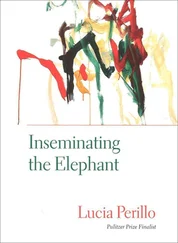There is something frightening about them, frightening because they are beyond our reach. Biologists speak of “managing” a living resource, intervening in the natural history of a creature to make it more compatible with human life. But this army of dead salmon is not listening to us anymore. It’s as if death has inoculated them against our interventions.
In her poem number 1691, Emily Dickinson coins her own word for the dead’s ungovernable nature:
The overtakelessness of those
Who have accomplished death
Majestic is to me beyond
The majesties of Earth.
The soul her “Not at Home”
Inscribes upon the flesh—
And takes her fair aerial gait
Beyond the hope of touch.
Here, as in the Book of the In-between , death is work to be “accomplished,” and those who have succeeded in this work can no longer be overtaken by us who remain locked in our gravity-bound flesh. In Dickinson’s version of death’s conversions of the body, the soul then gambols off into the sky — and it is curious how many paintings of spawned-out salmon show them inhabiting the medium of air, as though they no longer float in the water because they have become substances made of breath.
“Ghost salmon” one might say, just as, looking at spawned out fish in the real world of the real wild, they do seem to glow with the spectral quality of ghosts. In the cases of some dead fish, this analogy makes visual sense, as they are often covered with a white fungus that resembles snow. In one of the Bardo photographs the fungal fish hangs in a riffle of whitewater, its pose a mimic of that with which it fought its way upstream.
In his book Totem Salmon , Freeman House, another former commercial fisherman, sees the metaphor of the ghost playing out in the salmon’s natural history, not just in the individual fish but also in the salmon population as a whole. House reminds us of the pains that we call phantoms when they inhabit the missing limbs of amputees, evidence of the nervous system’s remembrance of the part that has been lost. Likewise, the environment “remembers” those species that have been cut from it. “The local field of being that we call the ecosystem,” theorizes House,
must experience a period of adjustment when one of its organisms has disappeared — even if the disappearance has occurred over a period of time beyond human understanding. When people, accidentally or purposefully, experience engagement with these fields of being, the direct, ineffable sense of the ghosts of lost creatures may come visiting.
The ghosts are globes of emptiness floating through the bloodstream of life, nearly lost memories of the void left by some absent life form. Ecosystem absences can become palpable presence, a weird stillness moving against the winds of existence and leaving a waveform of perturbation behind. Most humans are slower to see and feel in this realm, surrounded as we are by the noise of machinery, the buzz and hum of electricity. We need a tsunami of absence to get our attention.
I think this interpretation of the depleted world wouldn’t be lost on the Tibetans, in whose scheme of things — as we are born and die and are born and die again — we ping-pong between realms that include humans, animals, and ghosts (and also hells and demigods and gods). It is easy to conceive of a Buddhist ether where globes of emptiness float around waiting to be filled by consciousnesses whose body-vessels have run their course. We snag a globe on the fly and are born into our next life, and the Bardo Thodol is a how-to manual on navigating what it calls “the terrors” that will face us between lives.
What the book contains is a series of prayers to be read to the person who has knocked on death’s door and now waits for death to answer. Though one of the book’s operative words is compassion , it also insists above all that the task of death be approached with a clear head. In Robert Thurman’s translation, the prayers have all the briskness of a boot-camp drill:
Hey! Now when the life between dawns upon me.
I will abandon laziness, as life has no more time. .
This once that I’ve obtained the human body
is not the time to stay on the path of distractions.
Elsewhere the imperatives are even more forthright, reminding me of nothing so much as that point in old movies when a character is momentarily overtaken by hysteria, and the hero with a cooler head has to slap the hysteric’s cheeks. “Hey Noble One! Listen Without Wavering!” is the common opener to the prayers, which are to be read to the one who traverses the landscape of the in-between so that his/her mind doesn’t run the risk of “riding the horse of breath like a feather blown on the wind, spinning and fluttering.”
In truth, I don’t know if I could handle having the Book of the In-between read to me if I were dying. The hierarchy of its afterlife seems another order of magnitude more complicated than life itself, and life itself possesses a degree of complexity that I barely feel equipped to negotiate. And then there is also the frightening aspect of its metaphysics, with fierce deities such as Yama, the naked hard-on’d blue-black fire-breathing-buffalo-riding god of the underworld. But one of its more reassuring aspects is how it puts the dying mind in the driver’s seat. Be fiercely courageous! is my favorite of its exhortations.
Salmon are so totemically identified with the Northwest that viewing their runs is one of the inaugurating rites for new citizens of the region. Another rite might involve buying whole fish cheaply at the Indian reservation’s tent stand and grilling them on the barbecue. There are seven indigenous Oncorhynchus species here, and most of them have several names — so another rite of immigration is mastering the lingo: coho sockeye humpy chum. And is it just a coincidence that this happens to be a near-homonym for the chant that is a Buddhist mainstay? Om mani padme hum , which Thurman says means “all is well with the universe, the force of good and love is everywhere and competent to help all beings out of every difficulty.” A nice idea, though I don’t know if I buy it. Stubbornly I cling to the material realm: coho sockeye humpy chum!
Yet eating salmon is a morally troubling act, because the fishing industry has hurt so many of their populations. And a person doesn’t even have to eat salmon to be a destructive force. The houses we live in are made from trees that once shaded salmon streams, and the dead limbs of those trees once kept carcasses from being swept downstream. The forest that’s been cleared to accommodate us once prevented dirt from muddying those streams. The electricity it takes to run the laptop that I write this on comes from dams that block their migratory routes; the runoff from the roads we drive on are full of toxic gook. The very act of moving here was probably the worst turn I ever did for the fish, as their numbers have dropped in inverse proportion to the burgeoning of the region’s human population.
I originally came to the Northwest to work as a park ranger, but after one particularly arduous summer I noticed that something strange was happening to me. I had no diagnosis, and yet I knew my body was changing — its muscles had become unreliable, as if they were no longer fully solid. My arm would sometimes act like an arcade crane that has trouble grabbing even the lightest toy. And my legs turned rubbery, or a jolt of electricity would sometimes travel down their lengths.
That was twenty years ago. A couple of months later the doctor showed me pictures of my brain dotted with white spots, which glowed as brightly on the magnetic-resonance images as the fungus on a fish. And though my acquisition of debilities has been slow, it has seemed as though I inhabited a liminal region that was a twilit version of “normal” living. But maybe this is a form of self-aggrandizement, seeing oneself as a walking (or not walking) member of the dead.
Читать дальше











![Various - Birds and Nature, Vol. 12 No. 5 [December 1902]](/books/745517/various-birds-and-nature-vol-12-no-5-december-thumb.webp)
![Various - Birds and Nature Vol. 11 No. 2 [February 1902]](/books/745533/various-birds-and-nature-vol-11-no-2-february-1-thumb.webp)